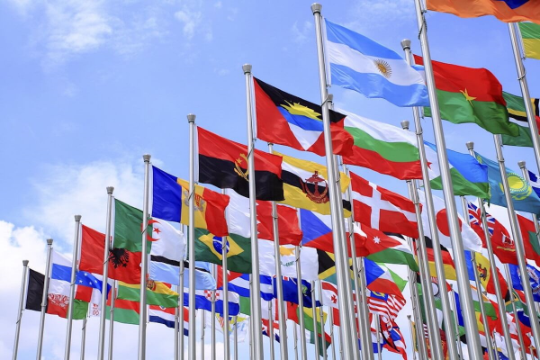The Pandemic and A New Shape for Global Political Order
Mahtab Uddin Chowdhury and Mahmudur Rahman | 11 December 2021
The Covid-19 pandemic ushered in a significant threat to the very existence of human life on this planet. But with threats comes an opportunity to reflect on life and an urge to protect what we cherish the most.
The pandemic demonstrated with both facts and figures that to solve a global problem, a collaborative global effort is required.
Disruptions to the supply chain and economic turbulence have created a new paradigm in politics with world leaders finding it cumbersome to keep up with the ever-changing status-quo caused by the Covid-19 pandemic.
South Asia is one of the world's most densely populated regions and as a result, the Indian sub-continent bore the brunt of the Covid-19 pandemic.
Infection and death rates are amongst the highest in Asia and vaccines remain elusive to a majority of the population.
The pandemic experience for South Asians was considerably harsh because of the high percentage of people living in poverty and extreme poverty. With no work and lackluster government support, their sufferings were, and to an extent still are, intolerable.
Although progress has been made on the vaccination front, a large population still remains outside the scope and plan of governments.
The Covid-19 pandemic has been poorly managed as a result of India's ongoing attempts to establish itself as a major world power and undemocratic attempts to solidify the Bharatiya Janata Party's rule. With a negative 7.8 per cent gross domestic product (GDP) growth rate for FY2020-21, this all but ensured a loss of economic progress.
On the plus side, Delhi has been able to produce around 100 million vaccines per month and ship over 10 million jabs around the world, including 3.3 million doses to Bangladesh as a show of support for the country in India’s fight for regional dominance against China.
Additionally, regional leaders are concerned about the Taliban regaining power, an event that showcased the ineffectiveness of the United States military in prolonged conflicts.
Beijing will be the beneficiary in the rise of the Taliban as all of Delhi’s investment has been washed down the drain, and they now have a potential terrorist organization as their neighbor. The Taliban will restore confidence to the extremist groups operating in this region.
South Asia as a region requires significant reshaping, with a particular emphasis on developing a post-pandemic policy framework and paying close attention to the Taliban rule in Afghanistan.
The recent pandemic has highlighted the world's leadership vacuum.
It is evident not only from the catastrophic failure during the pandemic, but also from the fact that anti-terrorism, anti-poverty, and climate change policies were insufficient prior to the pandemic's arrival.
The practice of shifting blame between China and the United States, China and the World Health Organization, or China and the European Union did not benefit other nations and instead slowed global development.
Inequality was already at an all-time high prior to the recent crisis. This demonstrates how global leaders' economic policies have impacted people living in poverty.
Multilateralism has failed the people of least developed and developing countries on numerous occasions. Now that climate change has been placed on the international agenda, it is time to see if world leaders can devise policies to reduce carbon emissions and halt the global warming process.
Multilateralism will be able to continue to exist if proper collective action is taken. Failure on climate policy will be a major setback for multilateralism's supporters.
Bangladesh has made significant economic progress in terms of GDP growth even during the pandemic. On the other hand, inequality is at an all-time high and is continuing to rise. Bangladesh's response to the Covid-19 pandemic has been mixed.
At first, the government lacked adequate policies to protect the population from the deadly virus but because of massive vaccination efforts and herd immunity, infection and death rates recently decreased. Still though, the coronavirus remains a threat.
Bangladesh and India share the world's longest land border and the two countries have had diplomatic relations ever since Bangladesh's founding. However, Bangladesh's reliance on China and other multilateral organisations is growing as a result of India's pandemic crisis.
Over the last two decades, Bangladesh's geostrategic importance has grown. Bangladesh is gaining opportunities to engage with the world's leading nations as a result of recent diplomatic shifts between countries.
As such, Bangladesh will undoubtedly find the post-pandemic period exciting as it investigates new offers and determines which to accept and which to reject.
Bangladesh must also conduct a thorough investigation into the situation in Afghanistan, as well as any inflows and outflows from Bangladesh to Afghanistan.
Using historical lessons as a guide, the government should assess the situation and determine the best course of action in dealing with Afghanistan. Vigilance will be essential if Bangladesh wants to maintain its zero-tolerance policy on terrorism.
The global political order will not stay the same, the balance of power will shift from west to east and east to west.
In the grand scheme of things, Bangladesh sits in an ideal spot and with its foreign policy of “Friendship to all and malice to none”, the country is poised to take advantage of the clash of titans.
The pandemic has shown how fast the world can change, those who have adapted the fastest have thrived and those who stick to old ideals have struggled.
It now remains to be seen how long the status quo will last and which way it tips next.
Mahtab Uddin Chowdhury, Research Assistant, Centre for Governance Studies (CGS).
Mahmudur Rahman, Research Assistant, Centre for Governance Studies (CGS).
Views in this article are author’s own and do not necessarily reflect CGS policy.
